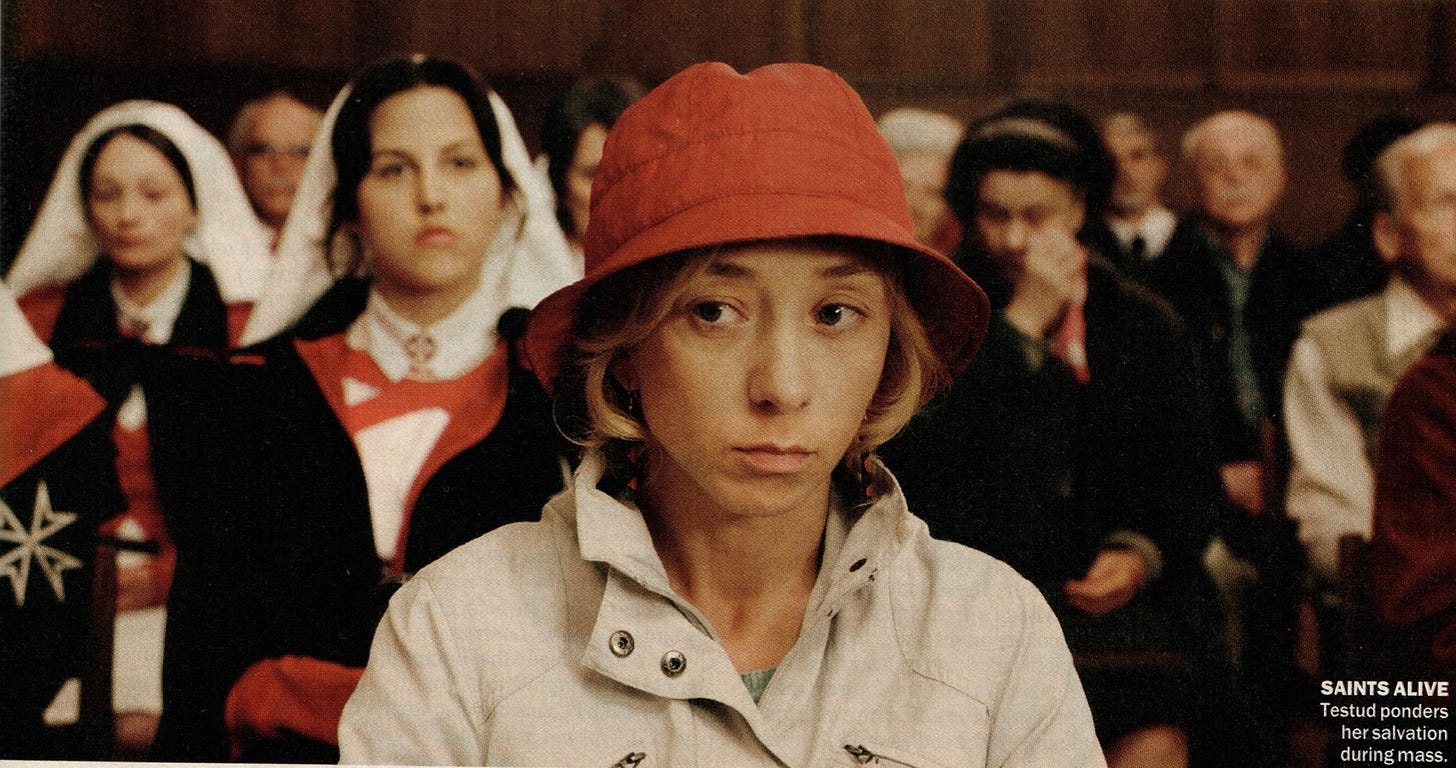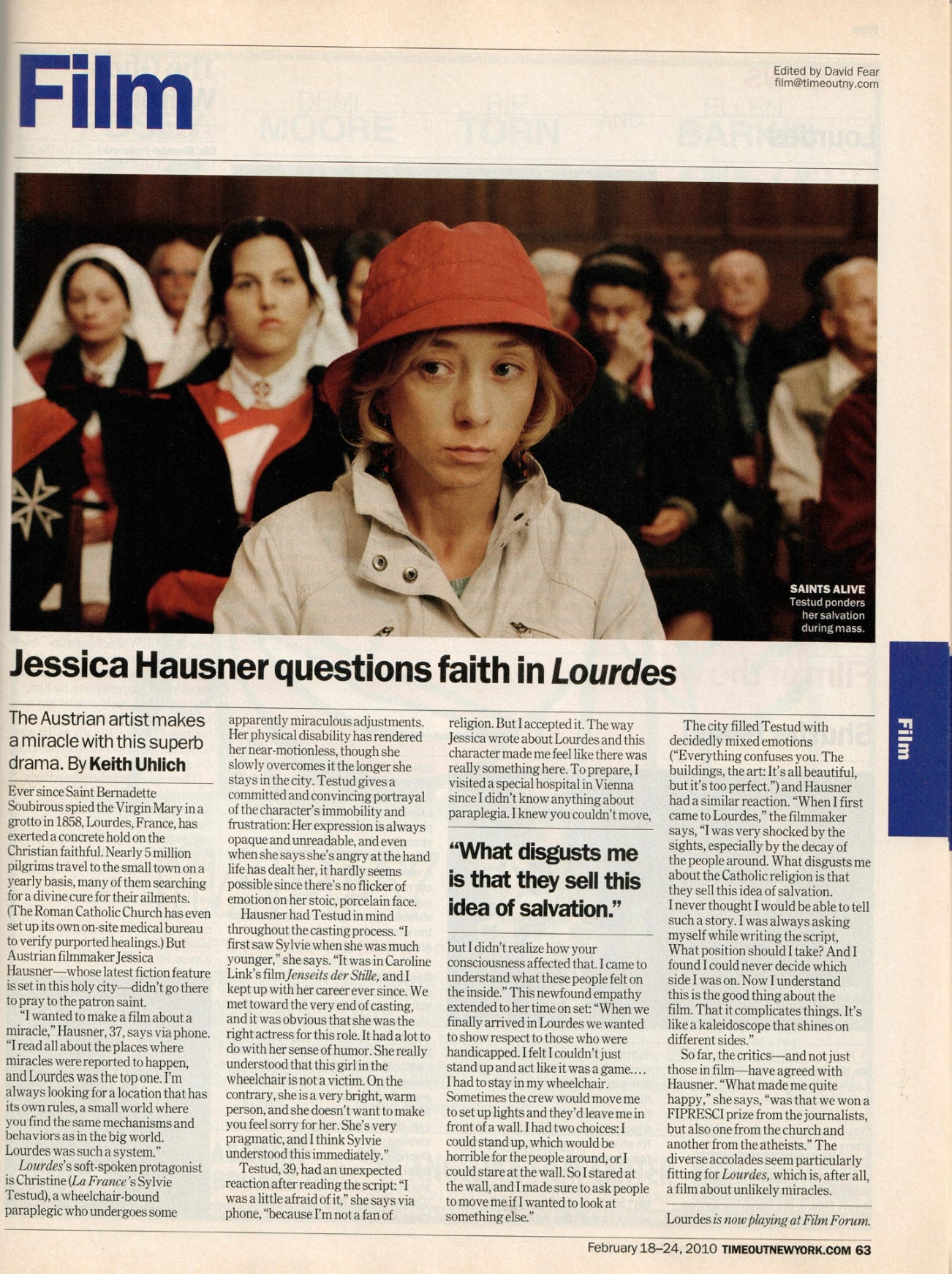Jessica Hausner questions faith in 𝙇𝙤𝙪𝙧𝙙𝙚𝙨
Time Out New York Project: Issue #751, February 18–February 24, 2010
[Author’s Note: I have no reviews in Issue #750, so jumping to Issue #751.]
The Austrian artist makes a miracle with this superb drama. By Keith Uhlich
Ever since Saint Bernadette Soubirous spied the Virgin Mary in a grotto in 1858, Lourdes, France, has exerted a concrete hold on the Christian faithful. Nearly 5 million pilgrims travel to the small town on a yearly basis, many of them searching for a divine cure for their ailments. (The Roman Catholic Church has even set up its own on-site medical bureau to verify purported healings.) But Austrian filmmaker Jessica Hausner — whose latest fiction feature is set in this holy city — didn’t go there to pray to the patron saint.
“I wanted to make a film about a miracle,” Hausner, 37, says via phone. “I read all about the places where miracles were reported to happen, and Lourdes was the top one. I’m always looking for a location that has its own rules, a small world where you find the same mechanisms and behaviors as in the big world. Lourdes was such a system.”
Lourdes’s soft-spoken protagonist is Christine (La France’s Sylvie Testud), a wheelchair-bound paraplegic who undergoes some apparently miraculous adjustments. Her physical disability has rendered her near-motionless, though she slowly overcomes it the longer she stays in the city. Testud gives a committed and convincing portrayal of the character’s immobility and frustration: Her expression is always opaque and unreadable, and even when she says she’s angry at the hand life has dealt her, it hardly seems possible since there’s no flicker of emotion on her stoic, porcelain face.
Hausner had Testud in mind throughout the casting process. “I first saw Sylvie when she was much younger,” she says. “It was in Caroline Link’s film Jenseits der Stille, and I kept up with her career ever since. We met toward the very end of casting, and it was obvious that she was the right actress for this role. It had a lot to do with her sense of humor. She really understood that this girl in the wheelchair is not a victim. On the contrary, she is a very bright, warm person, and she doesn’t want to make you feel sorry for her. She’s very pragmatic, and I think Sylvie understood this immediately.”
Testud, 39, had an unexpected reaction after reading the script: “I was a little afraid of it,” she says via phone, “because I’m not a fan of religion. But I accepted it. The way Jessica wrote about Lourdes and this character made me feel like there was really something here. To prepare, I visited a special hospital in Vienna since I didn’t know anything about paraplegia. I knew you couldn’t move, but I didn’t realize how your consciousness affected that. I came to understand what these people felt on the inside.” This newfound empathy extended to her time on set: “When we finally arrived in Lourdes we wanted to show respect to those who were handicapped. I felt I couldn’t just stand up and act like it was a game.…I had to stay in my wheelchair. Sometimes the crew would move me to set up lights and they’d leave me in front of a wall. I had two choices: I could stand up, which would be horrible for the people around, or I could stare at the wall. So I stared at the wall, and I made sure to ask people to move me if I wanted to look at something else.”
The city filled Testud with decidedly mixed emotions (“Everything confuses you. The buildings, the art: It’s all beautiful, but it’s too perfect.”) and Hausner had a similar reaction. “When I first came to Lourdes,” the filmmaker says, “I was very shocked by the sights, especially by the decay of the people around. What disgusts me about the Catholic religion is that they sell this idea of salvation. I never thought I would be able to tell such a story. I was always asking myself while writing the script, What position should I take? And I found I could never decide which side I was on. Now I understand this is the good thing about the film. That it complicates things. It’s like a kaleidoscope that shines on different sides.”
So far, the critics — and not just those in film — have agreed with Hausner. “What made me quite happy,” she says, “was that we won a FIPRESCI prize from the journalists, but also one from the church and another from the atheists.” The diverse accolades seem particularly fitting for Lourdes, which is, after all, a film about unlikely miracles.





